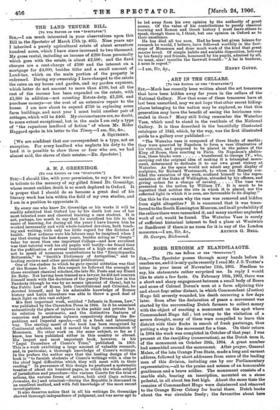A. H. J. GREENIDGE.
[TO THE EDITOR OP THE "SPECTATOR.']
SIR;—I should like, with your permission, to say a few words in tribute to the memory of my gifted friend Dr. Greenidge, whose recent sudden death is so much deplored in Oxford. It is proper that I should do so because a great deal of his literary work has lain within the field of my own studies, and I am in a position to appreciate it.
By every one who knew Dr. Greenidge or his works it will be readily admitted that Oxford has by his death lost one of her most talented sons and classical learning a rare student. It is not, perhaps, too much to say that he sacrificed his life to the cause of learning, for during all the years I have known him he worked incessantly and with whole-hearted devotion, both teach- ing and writing, with only too little regard for the dictates of health. How arduous were his labours may be imagined when I say that during the last dozen years, besides acting as " Greats" tutor for more than one important College—and how excellent was that tutorial work his old pupils will testify—he found time for the publication of several treatises of a high order of merit, not to speak of numerous contributions to the "Encyclopaedia Britannica," to " Smith's Dictionary of Antiquities," and to leading reviews and other periodical publications.
One of the studies to which he gave special attention was that of the Roman Law. In this respect he followed the example of those excellent classical scholars, the late Mr. Poste and my friend Dr. Roby. Not having been trained as a lawyer, he did not concern himself much with the doctrines of the purely Private Law in the Pandects (though he was by no means ignorant of these), but to 'the Public Law of Rome, both Constitutional and Criminal, he devoted himself, and by his admirable knowledge of Roman history and Latin literature was able to throw a good deal of fresh light on this vast subject.
Itis first important work, entitled " Infamia. in Roman, Law," was published by the Clarendon Press in 1894. In it he examined exhaustively the place of infamia in the public and private law, its relation to existimatio, and the distinctive features of censorian and praetorian infamia respectively during the Re- publican and Imperial epochs,—all in a fresh and interesting way. The sterling merit of the book has been recognised by Continental scholars, and it earned the high commendation of Mommsen. No other work on the same subject, so far as I know, has been published either in this country Or abroad. His largest and most important book, however, is his " Legal Procedure of Cicero's Time," published in 1901. This is a work exhibiting a large amount of valuable research, and, in particular, a thorough knowledge of Cicero's writings. In the preface the author says that the leading design of the book is " to furnish students of Cicero's writings with a clue to the chief legal difficulties which they will meet with in their reading." In pursuance of this design he produced a systematic treatise of about six hundred pages, in which the whole subject of jurisdiction and procedure—the various Courts for the trial of actions, the various forms of action, both civil (legis actiones, formulae, ece.) and criminal—during the Republic is discussed in an excellent method, and with .full knowledge of the most recent investigations.
It also deserves notice that in all his writings Dr. Greenidge showed thorough independence of judgment, and was never apt to
be led away from his own opinion by the authority of great names. Of the value of his contributions to purely classical learning and Roman and Greek history I must leave others to speak, though there is, I think, but one opinion in Oxford as to their excellence.
He has died all too soon. Had he been but given leisure for research he would, I believe, have followed worthily in the foot- steps of Mommsen and done much work of the kind that great master loved. Of simple habits and amiable disposition, beloved by his family and friends, honoured by his pupils, admired by all, we must, alas ! inscribe the farewell wreath : " A lui le bonheur, a nous le regret."










































 Previous page
Previous page